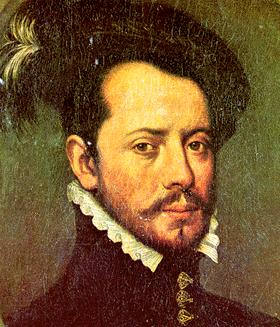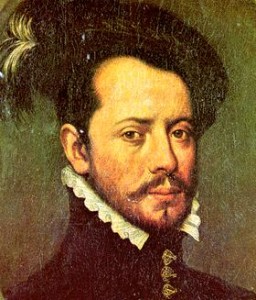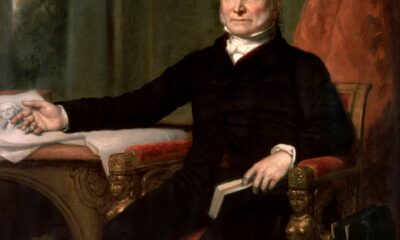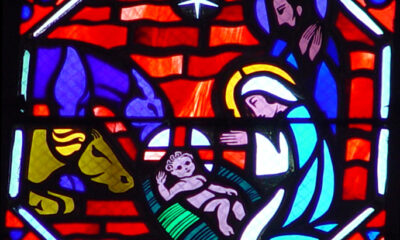Education
Cortez, conquerors, and missionaries

Chapter four begins with the acknowledgment of the complete failure of Columbus’ mission throughout South and Central America. Lawlessness of every kind blossomed in the New World. It presents a good argument for the need of a central government, a need that our Founders understood when they wrote our Constitution. The ungoverned inhumanity of an anarchic culture is evident. C. S. Lewis once said you cannot write laws fast enough to govern a people that will not govern themselves. A moral people who have the laws of God written on their heart can self govern. Such were the prevailing conditions that greeted men like Hernando Cortez and Francisco Pizarro.
Hernando Cortez and his band of Conquistadors did not have the laws of God written on their heart. Therefore self-government was elusive.
QUESTION: As America becomes more and more “Godless”, do you see anarchy replacing the Rule of Law in our land?
Cortez and the natives: who sinned worse?
The Bible says:
There is a way that seems right to a man, but its end is the way of death. Proverbs 14:12.
When Cortez landed in what would become Mexico City, he continued the operation of taking over the natives, in this case the Aztecs. Francisco Pizarro did the same in Peru. Gold continued to fuel the worst that is in man, and slowly the native populations were enslaved and died from the diseases that were being introduced. However evil the Conquistadors were, their evil was matched by some of the natives – those who practiced cannibalism and blood sacrifices. The kind and gentle people Columbus discovered were an anomaly in the New World. Although we often think that the Conquistadors brought evil into the New World, the truth is that evil already resided there.
CONSIDER: The natives did not have the benefit of the Bible or God’s laws. Cortez and the Conquistadors did. Although the laws of God were acknowledged by them, they certainly did not obey the “Golden Rule,” – treat others the way you want to be treated.
James says:
You believe that there is one God. You do well. Even the demons believe – and tremble. James 2:19.
QUESTION: The practice of evil can take on many faces, but it is evil nonetheless. Although the Spaniards knew God’s law, they didn’t practice it. The natives didn’t know God’s law and didn’t practice it. Do you think one group was more righteous than the other? Consider the verse above and think about the difference between the two groups. Which group do you think will held more accountable on Judgment Day and why?
Missionaries in Latin America
Cortez, however, did one thing that was good. He brought real Christians along with him to evangelize the New World. These monks didn’t talk the talk, they walked the walk. They proved it by the way they lived their lives. Based on his actions, It is more likely that Cortez brought the monks along just for the sake of appearances and to appease the Royals. Whatever his reasoning, he brought them. However, such seemed to be the state of Christianity in 1519.
CONSIDER: Christianity in 1519 was not practiced the way we think it should be. But we must consider that the Bible was left to the clergy’s interpretation – and the clergy were often indoctrinated into the state’s religion, i.e. the Church of England (which was ruled by Rome). Until John Wycliffe introduced the first handwritten Bible in English in 1380, all Bibles were printed in Latin. William Tyndale printed the first English Bibles in 1500s. At that time, these Bibles were illegal. Tyndale’s Bible was banned and Tyndale was eventually executed.
Martin Luther, who protested the spiritual hypocrisies of “the Church”, which earned his followers the label of Protestants, was inspired by being able to read the Bible in his own language (German).
QUESTION: Do you think that not having the full text of the Bible available during the time of the Conquistadors contributed to their savagery, or do you think the moral code of God should have been written on their hearts regardless?
Whatever his religious convictions (or lack thereof) Cortez brought back extraordinary servants of Christ in the form of Dominican and Franciscan monks. These men did what Columbus and Cortez spoke about doing. They evangelized the natives and made a positive difference in their lives.
CONSIDER: The Bible says, “If the foundations are destroyed, what can the righteous do?” Psalm 11:3. At this point in history in these parts of the Americas, the foundations of morality, religion, and government that existed were not righteous. In the parts of America that would eventually become the United States, the story was a different one – thanks to the Franciscan, Dominican and eventually the Jesuit monks and friars.
QUESTION: Today we can look back in history and modern times and see the differences between the countries that developed in Central and South America and North America. Do you think that the foundations that were laid had anything to do with it?
Government in Latin America
CONSIDER: Our neighbors to the south have had many forms of government over the years, as compared to our one form that was established after the Revolutionary War. Our Constitution and our form of government has lasted for well over 200 years (our Constitution was signed on Sept. 17, 1787 and ratified on June 21, 1788).
QUESTION: Since our Constitution, which was founded on Godly principles, has withstood the test of time and served us well for over 200 years, do you think that removing God from the public’s eye has had any impact on those who believe that our Constitution is antiquated?
QUESTION: The Royals came to the realization that it was more productive to send missionaries into the New World. However, colonization in the 1500s was only slightly better than serfdom. The Golden Rule simply did not have any impact on government. Why do you think this was the case?
A message for North America
QUESTION: In the United States many are justifiably horrified by the tarnish of slavery on the pages of our history. However, slavery and tyranny for many nationalities and for different religions existed all throughout history. Why do you think the wounds in the United States still haven’t healed while they don’t ever seem to be acknowledged in the rest of the world?
Before answering, read Rev. 3:19, 1 Cor. 11:32, 33; Hebrews 12:4-7
QUESTION: If you think our preoccupation with racism is God chastening us for our history, do you think we are getting the message? If not, what do you think is hindering the message?
QUESTION: People almost seem to worship our Founders, who were brilliant men but sinners – just as we are. These men, who wrote “all men are created equal”, had slaves. On the other hand, people today almost worship hate mongers who parade themselves as servants of God. In both cases, we don’t seem to be able to look beyond the glory to the humanness. Do you think these blinders that we wear have also made us deaf to God’s chastening?
Men who made a difference
The Royals elected to send Bartolomeo de La Casas, (whom they had sent before to replace Columbus) to Cuba. He came to detest the colonization methods being used as well as the history that he had experienced. La Casas did his best to fight the atrocities and his revelations, in the form of a book he wrote, which made Spain a byword for cruelty throughout Europe.
CONSIDER: It is interesting to note how an author can make a difference. Thomas Paine’s Common Sense fanned the fires of liberty prior to the Revolutionary War and Harriet Beecher Stowe’s Uncle Tom’s Cabin, did much to awaken our citizens to the atrocities of slavery.
The Bible says:
My people are destroyed for lack of knowledge. Hosea 4:6
Sometimes an author can enlighten people in a way that opens their ears. Jesus often used parables to teach a point. In the two instances mentioned above, the authors did much to enlighten their contemporaries about the evils of their day.
There were a string of missionaries who came to the New World to spread the Gospel and not to fill their pockets with gold. Their missions spread throughout New Mexico, the Baja, the Colorado River, Arizona, and as far north as California. Where the missionaries established settlements, the people lived in peace and life flourished as opposed to the tyrannical governments being established by the power-crazed and ambitious Royal appointed rulers.
Need for righteous authorities
QUESTION: The Bible says,
When the righteous are in authority, the people rejoice. Proverbs 29:2.
There are many today (including Christians) that don’t think (and vote accordingly) that a person’s faith or belief system should have anything to do with their qualifications to run for public office. When you consider this verse, do you think this modern political philosophy has anything to do with the current fiascos this country is embroiled in?”
The righteous did what the Conquistadors could not. They established settlements that flourished, while they spread the Gospel. On the east coast, in 1513, Ponce de Leone discovered Florida but because of the environment, settling there was not successful until 1562 when a group of French Huguenots seeking religious freedom settled St. Augustine and in Beaufort, South Carolina. Other Spaniards unsuccessfully attempted to settle in Florida but they suffered through endless Indian raids and much sickness. Only the righteous succeeded.
The Jesuits were the next on the scene. They were extraordinary missionaries for this new land who were physically, mentally, and spiritually prepared to overcome the hardships they would experience.
The French missionaries arrived shortly after and made their way up to Canada and the St. Lawrence River and then Lake Huron. They spread into Illinois, Maine, the Mississippi Valley and Nova Scotia. One of the Jesuit explorers to earn fame was Father Jacques Marquette. His success led to orders for him to join with Louis Joliet to travel southward, down the Mississippi River toward the Gulf of Mexico. They went as far as the Arkansas River before turning back to honor his promise to return to Illinois Indians. Their relationship was a good one and they honored Father Marquette in his death as they did in his life.
The Iroquois experience
A different story was that of Father Jean de Brebeuf, who was a missionary to the Iroquois. The Iroquois were not as receptive as the Illinois and sought pleasure by torturing their victims savagely, as they did to father Breheuf, earning them the name “savage.”
Father Isaac Jogues was also captured by the Iroquois and tortured – but not to death. He was kept alive to entertain them as they continued to torture him. The Iroquois made a practice of making martyrs out of those who dared to speak to them about Christ but they didn’t martyr Father Jogues. After a year, he manage to escape to a Dutch colony in Albany. Father Jogues eventually returned to France where the story of his suffering made him a hero – which his humility found offensive and he begged to be sent back to serve the Indians. His request was honored and was sent back to the Iroquois as a French Ambassador, since they had just signed a peace treaty with the tribe. After this mission was completed, Father Jogues, who had earned the respect of the Indians, founded The Mission of the Martyrs.
QUESTION: Why do you suppose God requires different things from different people?
The diverse stories of the missionaries to North America were filled with success as well as human sacrifice. The faith of these men was tested and they prevailed. They paved the way for the English settlements.
[subscribe2]
RoseAnn Salanitri is a published author and Acquisition Editor for the New Jersey Family Policy Council. She is a community activist who has founded the Sussex County Tea Party in her home state and launched a recall movement against Senator Robert Menendez. RoseAnn is also the founder of Veritas Christian Academy, as well as co-founder of Creation Science Alive, and a national creation science speaker.
-

 Civilization2 days ago
Civilization2 days agoWhy Europe Shouldn’t Be Upset at Trump’s Venezuelan Actions
-

 Accountability5 days ago
Accountability5 days agoWaste of the Day: Principal Bought Lobster with School Funds
-

 Executive3 days ago
Executive3 days agoHow Relaxed COVID-Era Rules Fueled Minnesota’s Biggest Scam
-

 Constitution4 days ago
Constitution4 days agoTrump, Canada, and the Constitutional Problem Beneath the Bridge
-

 Christianity Today2 days ago
Christianity Today2 days agoSurprising Revival: Gen Z Men & Highly Educated Lead Return to Religion
-

 Civilization3 days ago
Civilization3 days agoThe End of Purple States and Competitive Districts
-

 Executive3 days ago
Executive3 days agoWaste of the Day: Can You Hear Me Now?
-

 Executive4 days ago
Executive4 days agoWaste of the Day: States Spent Welfare in “Crazy Ways”















Michael Alan Kline Sr liked this on Facebook.
Vernon Zimmermann liked this on Facebook.